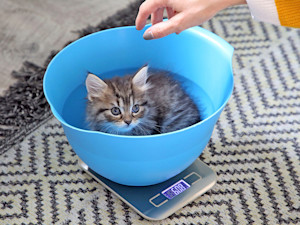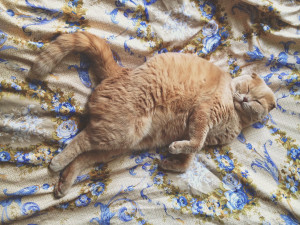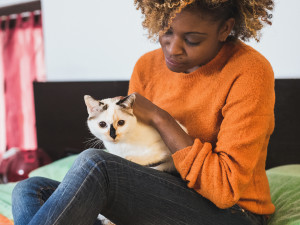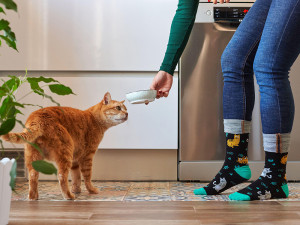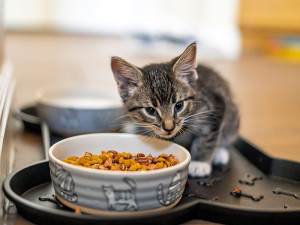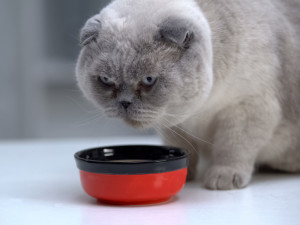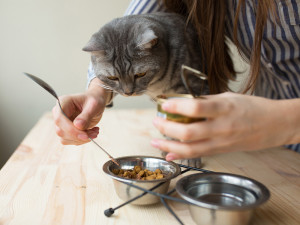Why Is Your Cat Losing Weight?
And what to do about it.

Share Article
In This Article:
Eight Reasons Why Your Cat May Be Losing Weight When to See a Vet
Figuring out how to get an overweight cat to shed a few pounds (without everyone going bonkers) is a common hurdle for cat parents. But what if your cat starts losing weight without trying? Unexpected weight loss in cats is concerning and should be investigated. Here are some reasons your cat may be getting too skinny.
Why is your cat losing weight?
Cat parents can expect some changes as their kitties get older, but it can be hard to know what’s normal. You may expect your cat to embody the skinny old cat cliche some day, but rapid weight loss is not normal. You may think, My cat still eats and plays, but now the weight loss is noticeable. I’ve tried different foods and treats, but she’s still losing weight. Should my cat be getting skinny like this?
Unexplained weight loss in cats is cause for concern and can be a clue to an underlying health issue. A cat’s weight loss is often more noticeable if it’s accompanied by other symptoms, like vomiting or diarrhea. Sometimes it’s obvious that a cat is losing weight because they’re not eating due to nausea or pain. With other conditions, cat parents may notice their cat eating but still losing weight.
There are many causes for weight loss in cats, including issues stemming from their mouth, intestinal tract, organ function, or hormone levels. Any cat with unexpected weight loss should be evaluated by a veterinarian.

Eight reasons why your cat may be losing weight
A cat’s weight loss can stem from an issue affecting one part of the body or systemic issues that affect that cat’s overall health. Some causes may be cured, while others require ongoing management. Here are some reasons why a cat may lose weight:
Dental issues
Oral pain can cause cats to not want to eat, especially dry kibble. The act of chewing can be so uncomfortable that cats will drop their food or skip eating all together. If dental pain is left unaddressed, a cat can start to lose weight. Signs of dental disease in cats include dropping food, reluctance to eat, drooling, facial swelling, bad breath, bleeding from the mouth, and teeth chattering.
A dental examination can get to the root of the problem. Your vet may recommend sedation to take a good look at your cat’s mouth or anesthesia to take dental x-rays to evaluate the tooth roots. Treatment may involve medications (pain meds and antibiotics), a full dental cleaning under anesthesia, and tooth extractions.
Hyperthyroidism
Weight loss despite a hearty appetite is a big clue for thyroid disease in cats.Thyroid hormones regulate metabolism and other bodily functions. Hyperthyroidism in cats is the overproduction of thyroid hormones, which leads to a dramatic increase in metabolism and weight loss. It’s most common in cats over ten years of age. Symptoms of cat hyperthyroidism include weight loss, vomiting, hyperactivity, excessive hunger, and increased thirst and urination.
Feline hyperthyroidism is diagnosed with a physical exam (palpating an enlarged thyroid gland) and blood work. There are four treatment options for cats with hyperthyroidism: radioactive iodine infusion, medication, prescription diet, and surgery to remove the thyroid gland.
Feline diabetes
Cats with diabetes are not able to use insulin effectively, leading to high blood sugar and weight fluctuation. Normally, diabetic cats will lose a noticeable amount of weight despite having a normal appetite. Other signs of diabetes in cats include increased thirst and urination.
Feline diabetes is diagnosed with blood work and managed with some combination of insulin, oral medications, and diet (low-carb is the way to go). Most cats diagnosed with diabetes have Type 2 diabetes, a condition in which the body doesn’t respond appropriately to insulin. With proper management, some cats with Type 2 diabetes can go into remission, resulting in normal blood sugar levels and return to a healthy weight.
Kidney disease
Chronic kidney disease (CKD) typically develops due to chronic inflammation of the kidneys and is a common condition in senior cats. Cats with early kidney disease can have a normal appetite and still lose weight; but as the disease progresses, or as complications arise, cats can lose their appetite as well.
Kidney disease is diagnosed with blood work, urinalysis, and blood pressure monitoring. Management of CKD in cats depends on the severity, but often includes diet and medication. Fluid therapy (either subcutaneous or intravenous) may be required depending on clinical signs.
Cancer
Unfortunately, cancer is often at the top of the list of possible causes when a senior cat is losing weight. Cancer can take many forms in cats, with two of the most common cancers being lymphoma and squamous cell carcinoma (SCC). The gastrointestinal tract is the most common site for lymphoma; GI lymphoma can lead to weight loss, vomiting, and diarrhea. SCC is a cancer of the skin cells and is the most common form of oral cancer in cats. Cats with oral SCC will lose weight because of difficulty or pain associated with eating.
Multiple tests are needed to diagnose and stage cancer in a cat losing weight. This may include blood work, cytology, biopsies, and imaging (X-rays or ultrasound). Treatment depends on the type of cancer, but options often include chemotherapy, radiation, surgery, or medications.
Gastrointestinal disease
Gastrointestinal diseases of any form — including inflammatory bowel disease, food intolerance, food allergies, cancer, and foreign bodies — can cause weight loss. For some cats, weight loss may be the first noticeable sign of GI issues, though many cats with GI disease will also experience vomiting, diarrhea, or appetite changes.
Stress
Imagine if every meal required you to walk through a haunted house, give a public speech, or take a surprise exam. Some cats experience the same level of stress, especially when their environment changes, and they choose to skip meals rather than deal with the anxiety. Stress in cats can cause behavioral changes like hiding, not eating, and overgrooming to the point of self trauma. A cat losing hair and weight after a recent move (or other major change) may need help coping with their anxiety.
Intestinal parasites
Intestinal worms can cause weight loss in cats by triggering inflammation in the gut and interfering with nutrient absorption. Some parasites will steal nutrients directly from the intestinal tract, leaving cats malnourished. Chronic malnutrition can lead to weight loss.
Intestinal parasites are most likely to cause weight loss in cats that are young, immunocompromised, or have severe infections. A fecal exam can reveal what types of worms a cat has so that an effective dewormer can be prescribed.
When to see a vet
If your cat is on a weight-loss plan and they start losing weight — kudos, that’s no small feat. However, if your cat is losing weight quickly and without reason, it’s time to talk to your vet. Weight loss in a cat should always be investigated, even if a cat is losing weight but acting normal.
Sometimes, issues like tumors or severe dental disease can be found on physical exam, but more often than not testing is needed to find the exact cause. Your vet will start with a medical history and physical exam. Based on those findings, additional diagnostics may be recommended, such as:
Blood work
Urinalysis
Sedated oral exam
Dental x-rays
X-rays of the chest or abdomen
Ultrasound
Fine needle aspirate
Biopsy
Fecal exam
Bottom line
Many health issues can cause weight loss in cats, including conditions like dental disease, hyperthyroidism, diabetes, kidney disease, and cancer. Stress and anxiety can also contribute to reduced appetite and weight loss. Some conditions can be addressed with appropriate treatment while others require long-term management. Weight loss in cats should always be investigated by a veterinarian.
References
Caney, Sarah. “Weight Loss in the Elderly Cat: Appetite Is Fine, and Everything Looks Normal ….” Journal of Feline Medicine and Surgery, vol. 11, no. 9, Sept. 2009, pp. 738–746, https://doi.org/10.1016/j.jfms.2009.07.008opens in new tab. Accessed 30 Mar. 2019.
“Disorders of the Thyroid Gland in Cats - Cat Owners.” Veterinary Manual, www.msdvetmanual.com/cat-owners/hormonal-disorders-of-cats/disorders-of-the-thyroid-gland-in-catsopens in new tab.
Mingus, Lauren. “Common Cancers in Cats - Flint Animal Cancer Center.” Flint Animal Cancer Center, 20 Nov. 2019, www.csuanimalcancercenter.org/2019/11/20/common-cancers-in-cats/opens in new tab

Dr. Alycia Washington, DVM, MS
Alycia Washington is a small-animal emergency veterinarian with over 10 years of experience based in North Carolina. She works as a relief veterinarianopens in new tab and provides services to numerous emergency and specialty hospitals. She also works as a veterinary writer with a focus on educating pet parents.
Related articles
![Woman petting her cat]()
Don’t Come For Us, But Is Your Cat Overweight?
We love a chonky cat, but here’s what you should know.
![a fluffy cat eating food from a bowl]()
Do Cats Need High-Calorie Cat Food?
Why you should only be packing on the calories in certain situations.
![orange cat being given a small cat food bowl]()
How Long Can Your Always-Hungry Cat Wait For Dinner?
Sometimes, they actually do need to eat.
![Kitten eating dry food from a bowl.]()
Can a Kitten Eat Dry Food?
And the nutrients you should make sure they’re getting.
![Cat eating out of a red bowl]()
Does Your Diabetic Cat Need a Special Diet?
Get ready for a sigh of relief — this food doesn’t have to be pricey.
![Woman feeds gray cat dry food.]()
Does Your Cat Need a High-Protein Diet Like Some Bro at the Gym?
While they might not be working on their “gains,” there are other reasons this diet could be a good fit.
